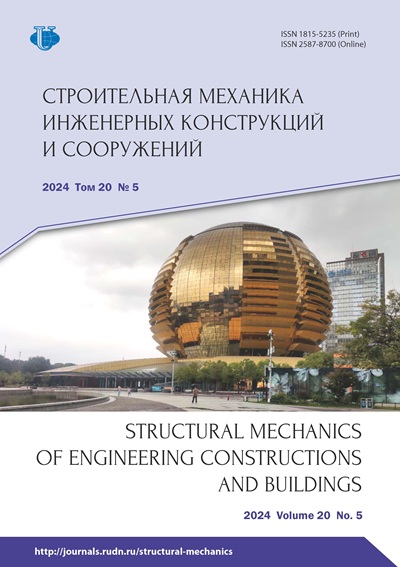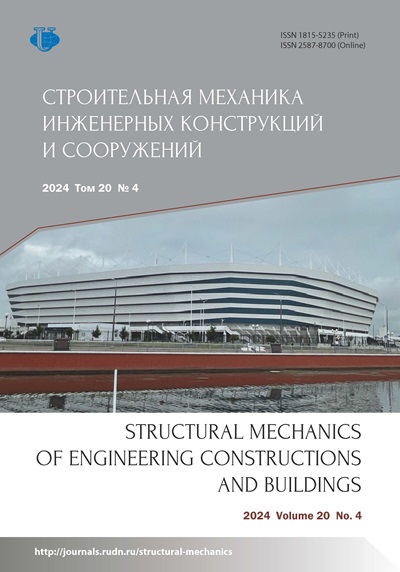Возможно ли определение траектории трещины сразу и в целом?
- Авторы: Морозов Е.М.1, Курбанмагомедов А.К.2
-
Учреждения:
- Национальный исследовательский ядерный университет МИФИ
- Российский университет дружбы народов
- Выпуск: Том 20, № 4 (2024)
- Страницы: 364-373
- Раздел: Теория пластичности
- URL: https://journals.rudn.ru/structural-mechanics/article/view/41546
- DOI: https://doi.org/10.22363/1815-5235-2024-20-4-364-373
- EDN: https://elibrary.ru/TCMXGL
Цитировать
Полный текст
Аннотация
Представлен краткий обзор методов расчета траектории трещины с использованием интегральных принципов механики. В двумерной постановке трещина рассматривается как геодезическая линия на поверхности тела с метрикой, которая зависит от начального напряженного состояния. Возможность приближенного определения траектории трещины на основе интегральных принципов проиллюстрирована на ряде задач. В частности, определены траектории трещины в полуплоскости под действием равномерно распределенной нагрузки на ее кромку. Расчеты включают напряженное состояние полуплоскости, взятое из решения для тела без трещины. Показана плодотворность представления смещений краев трещины с помощью гипотезы Винклера. Для изучения докритического поведения трещины может быть введено понятие cracon - квазичастицы, имитирующей движение вершины трещины. Проблема определения траектории трещины на основе интегральных принципов механики изучена недостаточно и требует дальнейших исследований.
Об авторах
Евгений Михайлович Морозов
Национальный исследовательский ядерный университет МИФИ
Email: evgeny.morozof@gmail.com
ORCID iD: 0000-0002-4824-8481
SPIN-код: 3989-2934
доктор технических наук, профессор, профессор кафедры физики прочности
Москва, РоссияАрслан Курбанмагомедович Курбанмагомедов
Российский университет дружбы народов
Автор, ответственный за переписку.
Email: kurbanmagomedov_ak@pfur.ru
ORCID iD: 0000-0001-9158-0378
SPIN-код: 5262-5269
кандидат физико-математических наук, старший преподаватель математического института С.М. Никольского
Москва, РоссияСписок литературы
- Xu S., Reinhardt H.W. Determination of double-K criterion for crack propagation in quasi-brittle fracture, Part I: Experimental investigation of crack propagation. International Journal of Fracture. 1999;98(2):111-149. https://doi.org/10.1023/A:1018668929989
- Седов Л.И. Механика сплошной среды. СПб.: Лань, 2004. EDN: QJMTCB
- Elices M., Guinea G.V., Gomez J., Planas J. The cohesive zone model: advantages, limitations and challenges. Engineering Fracture Mechanics. 2002;69(2):137-163. EDN: ASFTOD
- Schapery R.A. A theory of viscoelastic crack growth: revisited. International Journal of Fracture. 2022;233:1-16. https://doi.org/10.1007/s10704-021-00605-z
- Dombrovskii Y.M., Stepanov M.S. Mechanisms of Intragrain Plastic Deformation in Steel Heating Process. Metal Science and Heat Treatment. 2024;65:747-750. https://doi.org/10.1007/s11041-024-01000-w
- Komarov O.N., Sevastyanov G.M., Abashkin E.E., Khudyakova V.A. Shift of a Spherical Layer Under High Pressures. Metallurgist.2023;67:801-813. https://doi.org/10.1007/s11015-023-01568-3
- Lepikhin A.M., Morozov E.M., Makhutov N.A., Leschenko V.V. Possibilities of Estimation of Fracture Probabilities and Allowable Sizes of Defects of Structural Elements According to the Criteria of Fracture Mechanics. Inorganic Materials. 2023;59(15);1524-1531. https://doi.org/10.1134/S0020168523150074
- Mahutov N.A., Morozov E.M., Gadenin M.M., Reznikov D.O., Yudina O.N. Coupled thermo-mechanical analysis of stress-strain response and limit states of structural materials taking into account the cyclic properties of steel and stress concentration. Continuum Mechanics and Thermodynamics. 2023;35:1535-1545. https://doi.org/10.1007/s00161-022-01160-1
- Morozov E.M., Alymov M.I. Fracture Pressure in Microdefects of Consolidated Materials. Doklady Physical Chemistry. 2021;501:111-113. https://doi.org/10.1134/S0012501621110026
- Matvienko Y.G., Morozov E.M.Two basic approaches in a search of the crack propagation angle. Fatigue and Fracture of Engineering Materials and Structures. 2017;40(8):1191-1200. https://doi.org/10.1111/ffe.12583
- Pook L.P. The linear elastic analysis of cracked bodies, crack paths and some practical crack path examples. Engineering Fracture Mechanics. 2016;167:2-19. https://doi.org/10.1016/j.engfracmech.2016.02.055
- Morozov E.M., Alymov M.I. Fracture Pressure in Microdefects of Consolidated Materials. Doklady Physical Chemistry. 2021;501(1):111-113. https://doi.org/10.1134/S0012501621110026
- Курбанмагомедов А.К. Трещина нормального разрыва в упругом слое // Вестник ЧГПУ им. И.Я. Яковлева. Серия: Механика предельного состояния. 2017. № 1. С. 96-104. EDN: ZGIEKB
- Колесников Ю.В., Морозов Е.М. Механика контактного разрушения. М.: Наука, 2012. 224 c.
- Гордеева Г.В., Курбанмагомедов А.К., Спицов Д.В. Контроль прочности бетонных конструкций при проведении оценки остаточного ресурса зданий и сооружений опасного производственного объекта в сфере теплоэнергетики // Системные технологии. 2022. № 4. C. 73-86. https://doi.org/10.55287/22275398_2022_4_73
- Kurbanmagomedov A., Radzhabov Z., Okolnikova G. Investigation of Normal Fracture Cracks in an Infinite Elastic Medium. In: Guda, A. (eds) Networked Control Systems for Connected and Automated Vehicles. NN 2022. Lecture Notes in Networks and Systems. Springer, Cham. 2022;509. https://doi.org/10.1007/978-3-031-11058-0_142
- Nikhamkin M., Ilinykh A. Low cycle fatigue and crack grow in powder nickel alloy under turbine disk wave form loading: Validation of damage accumulation model. Applied Mechanics and Materials. 2014;467:312-316. https://doi.org/10.4028/www.scientific.net/AMM.467.312
- Яблонский А.А., Никифорова В.М. Курс теоретической механики. М.: Изд-во КноРус, 2011. 603 с. EDN: QJYXKR
- Hou J.-P., Wang Q., Yang H.-J., Wu X.-M., Li Ch.H., Zhang Zh.-F., Li X.W. Fatigue and Fracture behavior of a Cold-Drawn Commercially pure aluminum wire. Materials. 2016;9(9):764. https://doi.org/10.3390/ma9090764
- Wang Q., Ren J.Q., Wu Y.K., Jiang P., Sun Z.J., Liu X.T. Comparative study of crack growth behaviors of fullylamellar and bi-lamellar Ti-6Al-3Nb-2Zr-1Mo alloy. Journal of Alloys and Compounds. 2019;789:249-255. https://doi.org/10.1016/j.jallcom.2019.02.302
- Sadananda K., Babu M.N., Vasudevan A.K. A review of fatigue crack growth resistance in the short crack growth regime. Materials Science and Engineering: A. 2019;754:674-701. https://doi.org/10.1016/j.msea.2019.03.102
- Mall S., Perel V.Y. Crack growth behavior under biaxial fatigue with phase difference. International Journal of Fatigue. 2015;74:166-172. https://doi.org/10.1016/j.ijfatigue.2015.01.005
- Berto F., Ayatollahi M.R., Borsato T., Ferro P. Local strain energy density to predict size-dependent brittle fracture of cracked specimens under mixed mode loading. Theoretical and Applied Fracture Mechanics. 2016;86(Part B): 217-224. https://doi.org/10.1016/j.tafmec.2016.07.004
- Kaminsky A.A., Kurchakov E.E. Fracture Process Zone at the Tip of a Mode I Crack in a Nonlinear Elastic Orthotropic Material. International Applied Mechanics. 2019;55(1):23-40. https://doi.org/10.1007/s10778-019-00931-9
- Tumanov A.V., Shlyannikov V.N., Zakharov A.P. Crack growth rate prediction based on damage accumulation functions for creep-fatigue interaction. Fracture and Structural Integrity. 2020;14(52):299-309. https://doi.org/10.3221/IGF-ESIS.52.23
- Ghelichi R., Kamrin K. Modeling growth paths of interacting crack pairs in elastic media. Soft Matter. 2015;(11): 7995-8012. https://doi.org/10.1039/c5sm01376c
- Musayev V.K. Mathematical Modeling of Stresses Under Unsteady Wave Action in Geo-Objects. Power Technology and Engineering. 2023;57(3):351-364. https://doi.org/10.1007/s10749-023-01668-9
- Stepanova L.V., Roslyakov P.S. Multi-parameter description of the crack-tip stress field: analytic determination of coefficients of crack-tip stress expansions in the vicinity of the crack tips of two finite cracks in an infinite plane medium. International Journal of Solids and Structures. 2016;100-101:11-28. https://doi.org/10.1016/j.ijsolstr.2016.06.032
- Xu S., Xiong L., Deng Q., McDowell D.L. Mesh refinement schemes for the concurrent atomistic-continuum method. International Journal of Solids and Structure. 2016;90:144-152. https://doi.org/10.1016/j.ijsolstr.2016.03.030
- Carpinteri A., Brighenti R., Spagnoli A. Part-through cracks in pipes under cyclic bending. Nuclear Engineering and Design. 1998;185(1):1-14. https://doi.org/10.1016/S0029-5493(98)00189-7
- Carpinteri A., Brighenti R., Spagnoli A. Fatigue growth simulation of part-through flaws in thick-walled pipes under rotary bending. International Journal of Fatigue. 2000:22(1):1-9. https://doi.org/10.1016/S0142-1123(99)00115-2
- Musayev V.K. Mathematical Modeling of Explosive and Seismic Impacts on an Underground Structure. Power Technology and Engineering. 2024;57(6):875-881. https://doi.org/10.1007/s10749-024-01751-9
- Astafyev V.I., Radaev Yu.N., Stepanova L.V. Nonlinear mechanics of destruction. Samara: Samara National Research Астафьев В.И., Радаев Ю.Н., Степанова Л.В. Нелинейная механика разрушения Сам. гос. ун-т. Самара: Сам. ун-т, 2001. 630 c. EDN: XDVQPF
















